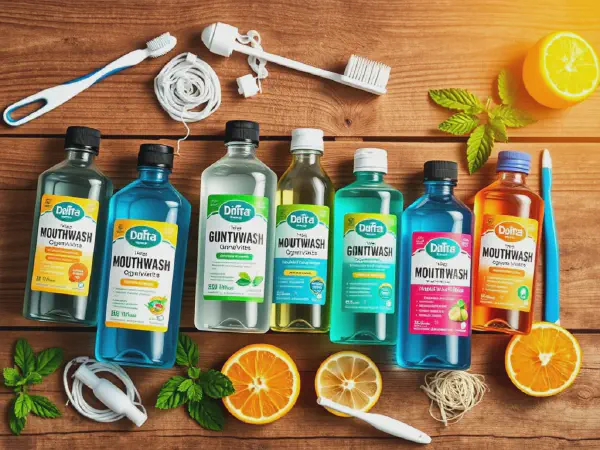The Ultimate Guide to Finding the Best Mouthwash for Gingivitis

The Ultimate Guide to Mouthwash for Gingivitis
Gingivitis is a common dental condition characterized by inflammation of the gums. It is caused by the buildup of plaque along the gumline, which leads to bacterial growth and irritates the gum tissue. If left untreated, gingivitis can progress to periodontitis, a more severe form of gum disease. Thankfully, there are several effective ways to treat and prevent gingivitis, one of which is using mouthwash specifically designed for this condition.
To fight against gum disease effectively, consider using the best mouthwash for gingivitis.
Mouthwash for gingivitis can help reduce inflammation, kill bacteria, and freshen breath. It is an important addition to a comprehensive oral hygiene routine, along with regular brushing and flossing. In this article, we will discuss the causes and symptoms of gingivitis, the types of mouthwash available, key ingredients to look for, tips for choosing the best mouthwash, how to use mouthwash effectively, other home remedies for gingivitis, and prevention strategies.
Causes of Gingivitis:
1. Plaque buildup: When bacteria in the mouth mix with saliva and food particles, they form a sticky film called plaque. If plaque is not regularly removed through brushing and flossing, it can harden into tartar, which irritates the gums and causes gingivitis.
2. Poor oral hygiene: Inadequate brushing and flossing allow plaque to accumulate, increasing the risk of gingivitis.
3. Smoking: Tobacco use weakens the immune system and makes it harder for the gums to heal, making smokers more susceptible to gingivitis.
4. Hormonal changes: Hormonal fluctuations during pregnancy or menopause can make the gums more sensitive and prone to inflammation.
5. Certain medications: Some medications, such as anticonvulsants and anti-angina drugs, can cause gingival enlargement and increase the risk of gingivitis.
Symptoms of Gingivitis:
1. Red and swollen gums: Inflammation is a hallmark sign of gingivitis. Gums may appear red, swollen, and tender to the touch.
2. Bleeding gums: Gums may bleed easily during brushing, flossing, or even when eating certain foods.
3. Bad breath: Bacteria in the mouth release foul-smelling gases, causing persistent bad breath.
4. Sensitive gums: Gingivitis can make the gums more sensitive to hot or cold temperatures and spicy foods.
5. Receding gums: As gingivitis progresses, the gum tissue may begin to pull away from the teeth, creating pockets where bacteria can accumulate.
Types of Mouthwash for Gingivitis:
1. Antibacterial mouthwash: These mouthwashes contain ingredients like chlorhexidine and cetylpyridinium chloride, which kill the bacteria responsible for gingivitis.
2. Fluoride mouthwash: Fluoride helps strengthen tooth enamel and prevent tooth decay, which can contribute to gum disease.
3. Alcohol-free mouthwash: Alcohol can be drying and irritating to the gums, so alcohol-free mouthwash is a gentler option for individuals with sensitive gums.
4. Natural mouthwash: Natural mouthwash may contain herbal extracts like tea tree oil, which has antibacterial properties, and aloe vera, which soothes inflamed gum tissue.
5. Prescription mouthwash: In certain cases, dentists may prescribe a medicated mouthwash containing higher concentrations of active ingredients for more severe cases of gingivitis.
Ingredients to Look for in a Mouthwash for Gingivitis:
1. Chlorhexidine: This antibacterial agent kills the bacteria that cause gingivitis and helps prevent plaque buildup.
2. Cetylpyridinium chloride: Another effective antibacterial ingredient that helps reduce plaque and inflammation.
3. Fluoride: Strengthens tooth enamel and prevents tooth decay, reducing the risk of gum disease.
4. Essential oils: Tea tree oil, eucalyptus oil, and peppermint oil have natural antimicrobial properties and help freshen breath.
5. Xylitol: This natural sweetener not only adds a pleasant taste to mouthwash but also helps inhibit the growth of bacteria.
Tips for Choosing the Best Mouthwash for Gingivitis:
1. Consult with your dentist: Your dentist can recommend a mouthwash specifically suited for your condition and oral health needs.
2. Consider your specific needs: Choose a mouthwash that addresses your specific symptoms, such as bleeding gums or bad breath.
3. Read customer reviews: Look for testimonials from other individuals who have used the mouthwash to gauge its effectiveness.
4. Check for ADA seal of approval: Look for the American Dental Association (ADA) seal, which indicates that the mouthwash meets high safety and effectiveness standards.
5. Look for products with clinical studies: Research-backed mouthwashes have been tested for their efficacy in reducing gingivitis and improving oral health.
How to Use Mouthwash for Gingivitis:
1. Follow the instructions on the label: Each mouthwash may have specific instructions for use, so be sure to read and follow them carefully.
2. Rinse with the mouthwash for the recommended time: Most mouthwashes require rinsing for 30 seconds to 1 minute for optimal effectiveness.
3. Do not swallow the mouthwash: Spit out the mouthwash after rinsing. Swallowing it can lead to stomach upset.
4. Use in conjunction with regular brushing and flossing: Mouthwash is not a substitute for brushing and flossing but should be used as an additional step in your oral hygiene routine.
5. Maintain a consistent oral hygiene routine: Use mouthwash daily or as directed by your dentist to achieve maximum benefits.
Other Home Remedies for Gingivitis:
1. Saltwater rinse: Mix half a teaspoon of salt in a glass of warm water and swish it around your mouth for 30 seconds before spitting it out. Saltwater rinse helps reduce inflammation and kill bacteria.
2. Oil pulling: Swish a tablespoon of coconut oil or sesame oil in your mouth for 10-15 minutes before spitting it out. Oil pulling can help reduce plaque and improve gum health.
3. Turmeric: Mix turmeric powder with water to form a paste and apply it to your gums. Turmeric has anti-inflammatory and antibacterial properties.
4. Aloe vera: Apply a small amount of pure aloe vera gel to your gums and massage gently. Aloe vera soothes inflamed tissues and promotes healing.
5. Tea tree oil: Dilute a few drops of tea tree oil in water and use it as a mouthwash. Tea tree oil has antimicrobial properties that can help reduce gingivitis-causing bacteria.
Prevention of Gingivitis:
1. Brush your teeth twice a day: Use a soft-bristled toothbrush and fluoride toothpaste to remove plaque and bacteria.
2. Floss daily: Clean between your teeth and along the gumline to remove plaque and food particles that brushing alone cannot reach.
3. Use an antimicrobial mouthwash: Incorporate an antimicrobial mouthwash into your oral hygiene routine to control bacteria and reduce inflammation.
4. Get regular professional dental cleanings: Professional cleanings remove plaque and tartar buildup that cannot be removed by brushing and flossing alone.
5. Maintain a healthy diet: Limit sugary and starchy foods, which can contribute to plaque formation. Eat a balanced diet rich in fruits, vegetables, and lean proteins.
By following these preventive measures and incorporating mouthwash specifically designed for gingivitis into your routine, you can effectively manage and prevent this common oral health condition.
